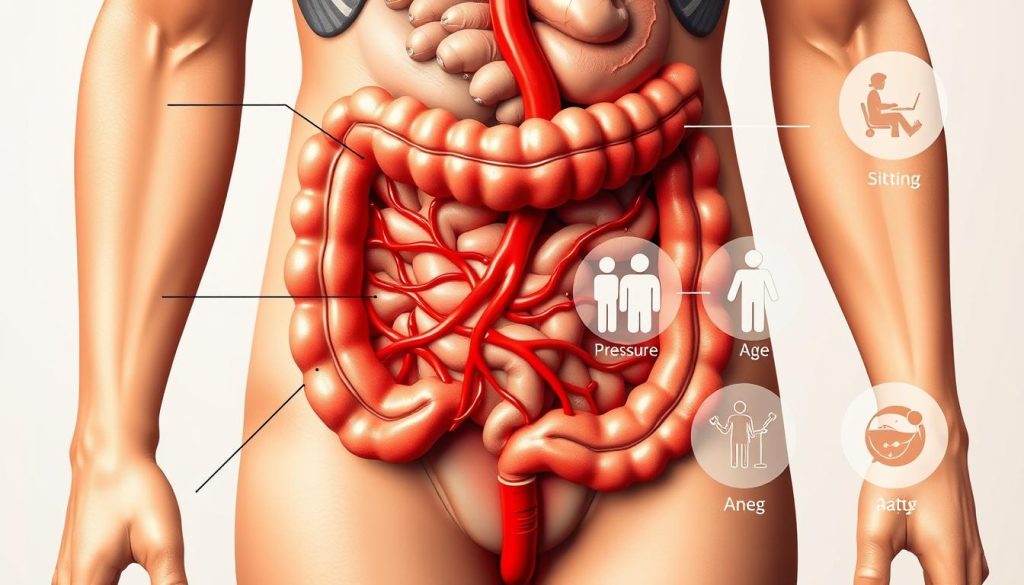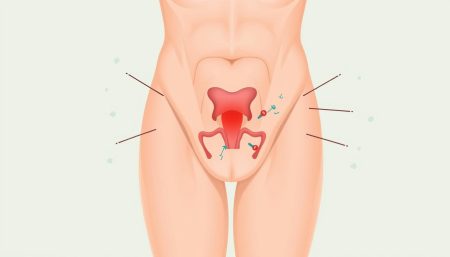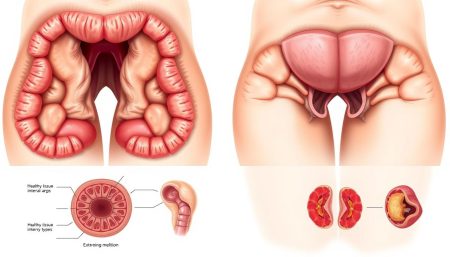Hemorrhoids are a common problem that many people face but rarely talk about. Knowing what causes hemorrhoids is crucial for preventing and managing them. Hemorrhoids are swollen veins in the lower rectum and anus, caused by increased pressure.
By understanding the reasons for developing hemorrhoids, we can take steps to avoid them. This knowledge helps us reduce the discomfort that comes with them.
Medical studies have identified several risk factors for hemorrhoids. These include certain lifestyles and health conditions. Making early changes in our lifestyle can help prevent or lessen the severity of hemorrhoids.
In this section, we’ll explore these factors based on the latest medical research. Our goal is to give you the knowledge you need for better rectal health.
Key Takeaways
- Recognizing the various factors that precipitate hemorrhoids is essential to prevention and management.
- Increased pressure in the rectal area is a primary mechanism behind the development of hemorrhoids.
- Lifestyle choices and health situations can significantly impact the risk of experiencing hemorrhoids.
- Medical research provides data supporting the importance of early risk factor identification.
- Adapting habits and seeking knowledge on rectal health can lead to reduced hemorrhoidal discomfort.
Anatomy of Hemorrhoids: A Brief Overview
Hemorrhoids are clusters of tissue in the rectal area. They are made of blood vessels, muscle, and connective tissue. These tissues are covered by the rectal epithelium. Hemorrhoids can be internal or external, depending on their location.
To understand what causes hemorrhoids, we need to look at their structure. Normally, these tissues help control stool. But, they can become a problem if they swell or get inflamed. This usually happens when there’s too much pressure on the veins or if the veins are weak.
The anatomy of hemorrhoids is key to understanding hemorrhoid triggers. For instance, anything that raises abdominal pressure can make hemorrhoids worse. This includes straining during bowel movements, constipation, and sitting for too long.
| Normal Condition | When Hemorrhoids Develop |
|---|---|
| Vascular cushions aid in stool control | Swelling occurs, interrupting normal function |
| Veins and tissues are stable | Vein walls weaken or are pressurized |
| Effective blood flow in rectal area | Increased vein pressure leads to discomfort |
Chronic conditions like constipation often lead to prolonged straining. This is a major factor in what causes hemorrhoids. Unlike the normal flow of gravity during bowel movements, straining increases pressure on veins. This leads to the common discomfort of hemorrhoids.
Understanding the rectal vascular architecture is crucial. It’s not just for treating hemorrhoids but also for preventing and managing them. Knowing the hemorrhoid triggers helps in avoiding them.
What Causes Hemorrhoids: Pinpointing the Culprits
Understanding what causes hemorrhoids is key to preventing them. We’ll look at several main factors that lead to this condition.
Chronic Constipation and Straining
Chronic constipation and straining can harm the veins in your anus and lower rectum. This can make the veins swell, causing hemorrhoids. Eating more fiber and drinking plenty of water can help avoid hemorrhoids caused by constipation.
Long Periods of Sitting
Sitting for long times, especially on hard surfaces, puts pressure on your pelvic and anal veins. People with jobs that involve sitting a lot should take breaks and move around. This can reduce hemorrhoid risk.
Pregnancy and Hemorrhoidal Pressure
Pregnancy increases pressure on pelvic veins, leading to hemorrhoids. Safe exercises and a fiber-rich diet can help prevent this. They support hemorrhoid prevention during pregnancy.

Lifestyle Factors and Hemorrhoids
It’s important to know how our daily habits affect risk factors for hemorrhoids. This knowledge helps us prevent or manage stop hemorrhoids. Our lifestyle, from exercise to sitting time, greatly impacts our rectal health.
Sitting for long periods, especially in bad environments, increases hemorrhoid risk. Adding moderate exercise to your day can help. It improves blood flow and reduces vein pressure in your pelvic area.
- Increase physical activity to reduce sedentary periods.
- Practice correct posture to avoid unnecessary strain.
- Regular stretching or light exercises during work breaks.
Diet is also a big factor, especially fiber intake. A low-fiber diet makes stools harder, leading to more straining. This is a major risk factor for hemorrhoids. Eating more fiber can help soften stools and reduce straining, preventing hemorrhoids.
- Integrate more fruits and vegetables into meals.
- Choose whole grains over refined grain products.
- Include legumes, nuts, and seeds in your diet.
| Lifestyle Change | Benefits |
|---|---|
| Improved physical activity | Enhances blood flow and reduces pelvic pressure |
| High-fiber diet | Soften stools, less straining, reduced hemorrhoid risk |
| Proper hydration | Prevents hard stools, decreases straining efforts |
By making these lifestyle changes, we can improve our rectal health and prevent hemorrhoids. Start today and lower your risk of getting hemorrhoids.
Obesity: A Significant Risk Factor for Hemorrhoids
It’s important to know how extra weight can increase the risk of hemorrhoids. The extra weight puts more pressure on the pelvic and rectal areas. This can strain the veins and make hemorrhoids more likely.
The Role of Excess Weight in Hemorrhoid Development
Extra weight can cause more pressure in the abdomen. This can swell the veins in the rectum. This swelling can lead to painful hemorrhoids. Keeping a healthy weight is key to avoiding hemorrhoids.
Strategies for Managing Weight to Prevent Hemorrhoids
Managing your weight is crucial to avoid or lessen the impact of hemorrhoids. Here are some steps to consider:
- Eat foods high in fiber to help keep bowel movements regular. This can reduce the strain that can cause hemorrhoids.
- Stay active with regular exercise. This helps keep your weight healthy and reduces pressure on the rectal veins.
- Talk to healthcare providers about weight loss plans. They can help you find a diet and exercise routine that’s right for you.
By following these steps, you can manage your weight better. This can help manage hemorrhoids more effectively.
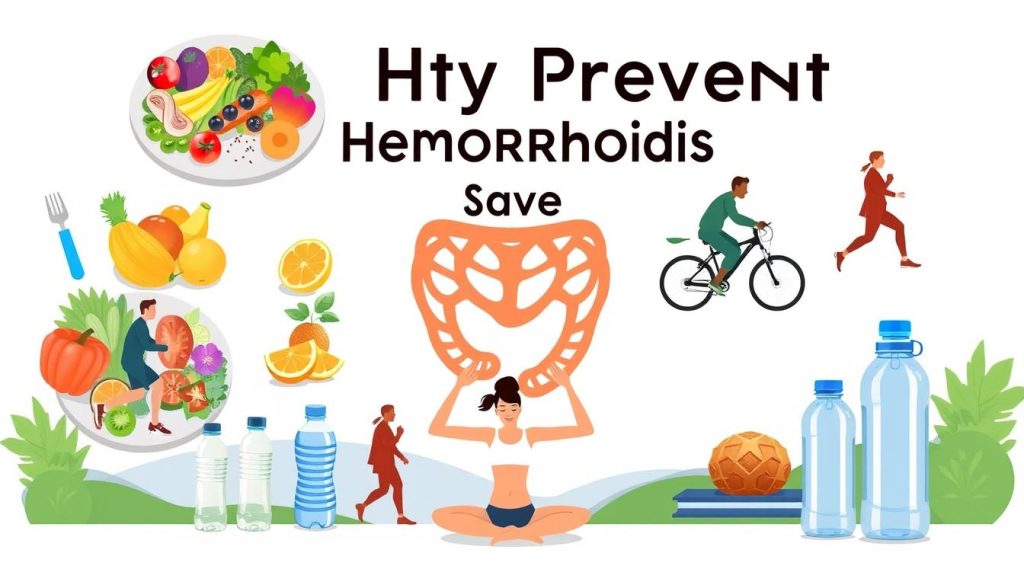
| Strategy | Description | Benefit |
|---|---|---|
| High-Fiber Diet | Increases stool bulk and consistency, reducing strain. | Decreases the risk of hemorrhoids by minimizing pressure during bowel movements. |
| Regular Exercise | Helps in overall weight reduction and improves circulation. | Reduces pelvic pressure, decreasing the risk of hemorrhoids. |
| Professional Consultation | Provides personalized dietary and exercise plans. | Ensures appropriate and effective weight management strategies that aid in reducing hemorrhoid risk. |
Impacts of Diet on Hemorrhoid Formation
Diet is very important for preventing hemorrhoids. It affects how well your bowels work and how often you go. Knowing what foods can help or hurt is key to keeping your rectum healthy.
Lack of Fiber and Hemorrhoids
Fiber makes your stools soft and easy to pass. This reduces pressure on your rectum when you go to the bathroom. Eating less fiber can lead to hard stools and straining, which increases the risk of hemorrhoids. Eating more fiber can help prevent them.
Hydration and Its Effects on Hemorrhoids
Drinking enough water is also crucial. It helps keep your stools soft and easy to move. This reduces the pressure on your veins. Knowing how water and fiber work together is important for hemorrhoid prevention.
| Fiber-Rich Foods | Benefits | Recommended Daily Intake |
|---|---|---|
| Whole grains (oats, barley) | Promotes bowel regularity, less strain | 25-30 grams |
| Fruits (berries, apples) | Helps to soften stool | 2-3 servings |
| Vegetables (broccoli, carrots) | Provides bulk to stools | 3-4 servings |
| Legumes (beans, lentils) | Supports digestive health | Alternate days |
Changing your diet can help manage and prevent hemorrhoids. Eating more fiber and staying hydrated are key. These habits should be part of your plan for hemorrhoid prevention and better digestion.
The Influence of Exercise on Hemorrhoidal Health
Regular physical activity is key for overall health and hemorrhoid management. It helps blood flow well and improves digestion. This can greatly reduce hemorrhoid risk.
Walking, swimming, and yoga boost blood flow in the pelvic area. This reduces pressure on veins around the anus and lower rectum. Regular exercise also helps prevent constipation, which can cause strain on hemorrhoids.
Exercise makes bowel movements smoother. This reduces stress on rectal veins. This helps manage hemorrhoids effectively.
- Walking: Encourages gentle internal movements.
- Swimming: Reduces gravitational pull on the rectal veins.
- Yoga: Enhances pelvic floor strength and circulation.
Consistency is crucial for exercise to reduce hemorrhoid risk. Daily moderate activity boosts colorectal and cardiovascular health. This is vital for managing and preventing hemorrhoids.
“Exercise plays a dual role in both preventing and managing hemorrhoids, making it a valuable component of hemorrhoidal health.”
Adding physical activity to your lifestyle can prevent and treat hemorrhoids. Keeping a healthy weight also helps reduce pressure on pelvic veins. This further improves the benefits of exercise on hemorrhoid risk.
Hemorrhoid Triggers: Understanding Genetic Predisposition
Lifestyle and diet are often talked about when it comes to reasons for developing hemorrhoids. But, genetics also play a big role. This section looks into how family history can increase the risk factors for hemorrhoids. It also talks about how genetics work with lifestyle choices to manage this common health issue.
Family History and Increased Hemorrhoid Risks
Research shows that people with a family history of hemorrhoids are more likely to get them. This genetic link shows that some people are more prone to the condition. It highlights the need to know your family’s medical history.
Hereditary Factors vs. Lifestyle Choices
Hereditary influence and lifestyle choices are different. But, changing lifestyle factors can help reduce genetic risks. Regular exercise, a fiber-rich diet, and staying hydrated are key. Knowing the signs early can help prevent or lessen hemorrhoids.
To manage both hereditary and lifestyle risk factors for hemorrhoids, stay alert to how your body reacts. Make changes early to tackle inherited risks and common reasons for developing hemorrhoids from daily activities.
Age-Related Hemorrhoid Risks and Concerns
As people get older, they are more likely to get hemorrhoids. This is because of changes in the body like weaker tissues and less blood flow. Knowing what causes hemorrhoid causes with age can help prevent and manage risk factors for hemorrhoids.
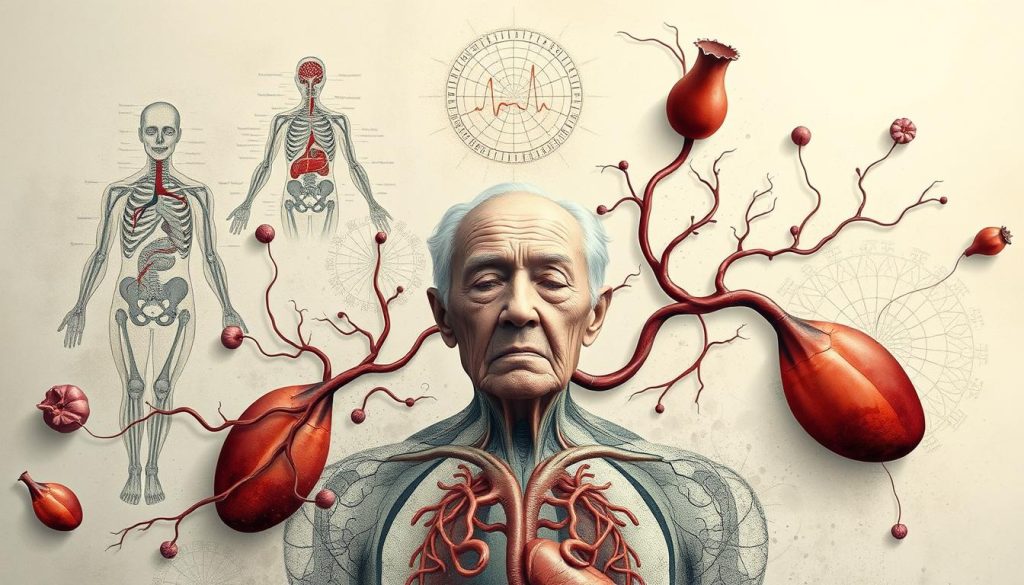
One big concern with age is how the body changes. The veins in the rectum get thinner and less strong. This makes it harder for them to hold blood, leading to hemorrhoids. It’s key to tackle these changes early on.
| Age Range | Prevalence of Hemorrhoids | Common Age-Related Changes Contributing to Hemorrhoids |
|---|---|---|
| 45-65 years | High | Weakening of tissue supporting anal cushions |
| 65+ years | Very High | Reduced rectal muscle tone and blood flow |
In older people, hemorrhoids are a big health worry. They can get worse because of other age-related issues like constipation or not moving much. To avoid hemorrhoids, older adults should exercise lightly, eat more fiber, and drink plenty of water.
Doctors need to teach older patients about risk factors for hemorrhoids and how to prevent them. Knowing about hemorrhoid causes and taking steps to prevent them can greatly improve health and quality of life for the elderly.
Analyzing Common Rectal Health Issues and Hemorrhoids
It’s important to know how certain health issues can lead to hemorrhoids. Conditions like chronic diarrhea and practices like anal intercourse can increase the risk. This is because they put extra strain and pressure on the rectal area.
Chronic Diarrhea and Its Role in Hemorrhoid Development
Chronic diarrhea is more than just a nuisance; it can harm your rectal health. It puts constant pressure on the veins in your pelvis and rectum. This can cause swelling and lead to hemorrhoids. It’s crucial to manage this condition to prevent hemorrhoids.
Anal Intercourse and Increased Hemorrhoid Risk
Anal intercourse can also increase your risk of getting hemorrhoids. The strain and minor injuries from intercourse can cause inflammation and swelling. This can trigger the development of hemorrhoids.
It’s important to take preventive steps and be aware of the factors that contribute to hemorrhoids. Here’s a comparison of how to reduce these risks:
| Risk Factor | Impact on Hemorrhoids | Preventive Measures |
|---|---|---|
| Chronic Diarrhea | Increases pressure on rectal veins | Stay hydrated, dietary fiber intake |
| Anal Intercourse | Causes strain and potential injuries | Use appropriate lubrication, gentle techniques |
By tackling these issues, you can lower your risk of getting hemorrhoids. This helps keep your rectal health in check.
The Role of Stress and Mental Health in Hemorrhoid Formation
Understanding why people get hemorrhoids involves looking at stress and mental health. Stress can harm the body in many ways, making it more likely for people to get hemorrhoids. This is a key area for hemorrhoid prevention.
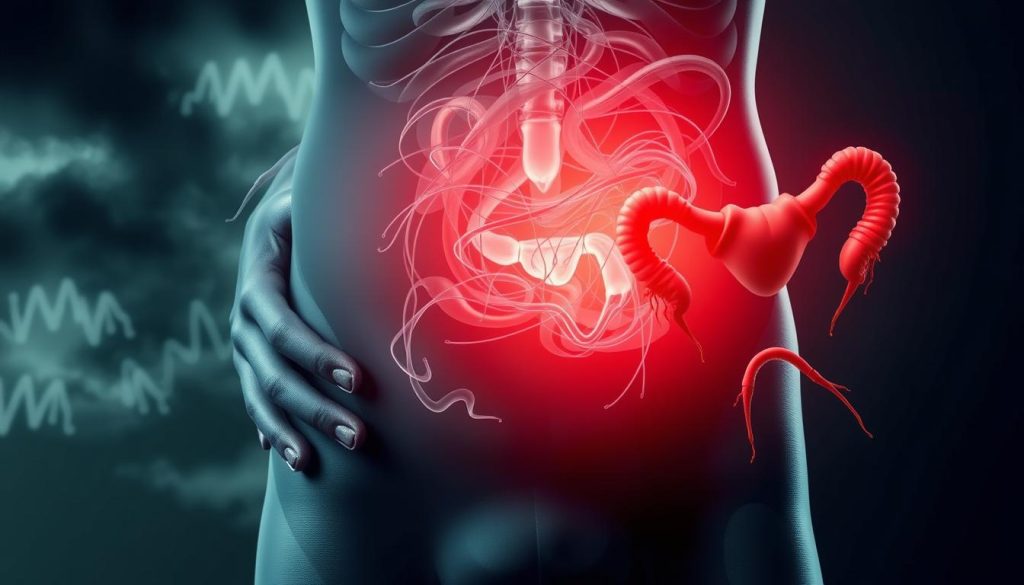
Stress can mess with how our guts work, causing constipation or diarrhea. Both are known to trigger hemorrhoids. Also, long-term stress can make us eat poorly and move less, increasing the risk of getting hemorrhoids.
| Stress Factor | Effect on Body | Impact on Hemorrhoid Risk |
|---|---|---|
| Increased Cortisol Levels | Can lead to poor bowel habits such as irregularity and constipation | Raises the likelihood of straining during bowel movements, exacerbating hemorrhoid formation |
| Emotional Eating | Leads to unhealthy food choices high in processed foods | Decreases dietary fiber intake, contributing to constipation and subsequent hemorrhoidal issues |
| Reduction in Physical Activity | Decreases gastrointestinal motility | Increases constipation and pressure on rectal veins, promoting hemorrhoids |
To prevent hemorrhoids, managing stress is key. Techniques like yoga, regular exercise, meditation, and a balanced diet help. These practices boost overall health and lower the reasons for developing hemorrhoids tied to mental health and stress.
Hemorrhoid Management: Reducing Flare-Ups and Pain
Managing hemorrhoids well is key for those wanting to avoid hemorrhoids and stop hemorrhoids from getting worse. A mix of methods can help lessen pain and aid in healing.
The Importance of Timely Bowel Movements
Having regular bowel movements is vital for preventing and managing hemorrhoids. They help move waste smoothly and reduce the need to strain. This is important because it lowers pressure on the veins around the anus and lower rectum.
Selecting the Right Hemorrhoid Treatments
The right treatment depends on the severity and type of hemorrhoids. Options range from changing your diet to using over-the-counter remedies or even medical procedures.
- Fiber Supplements: Soften stool to reduce straining.
- Warm Sitz Baths: Help relieve irritation and decrease swelling.
- Topical Treatments: Over-the-counter creams and ointments to lessen pain and inflammation.
- Minimally Invasive Procedures: For persistent or severe cases, options like rubber band ligation or sclerotherapy might be recommended.
Using these methods regularly can improve hemorrhoid management efforts. It helps keep the rectal area healthy and avoid hemorrhoids.
The Connection Between Heavy Lifting and Hemorrhoids
Heavy lifting is often overlooked as a major hemorrhoid trigger. It’s important to understand how hard work can lead to hemorrhoids. People who lift heavy, like construction workers, might face a higher risk.
The main reason is the extra pressure on the belly when lifting. This pressure can make veins in the lower rectum swell and get inflamed. This can cause hemorrhoids. So, it’s key to learn safe lifting and keep the workplace healthy.
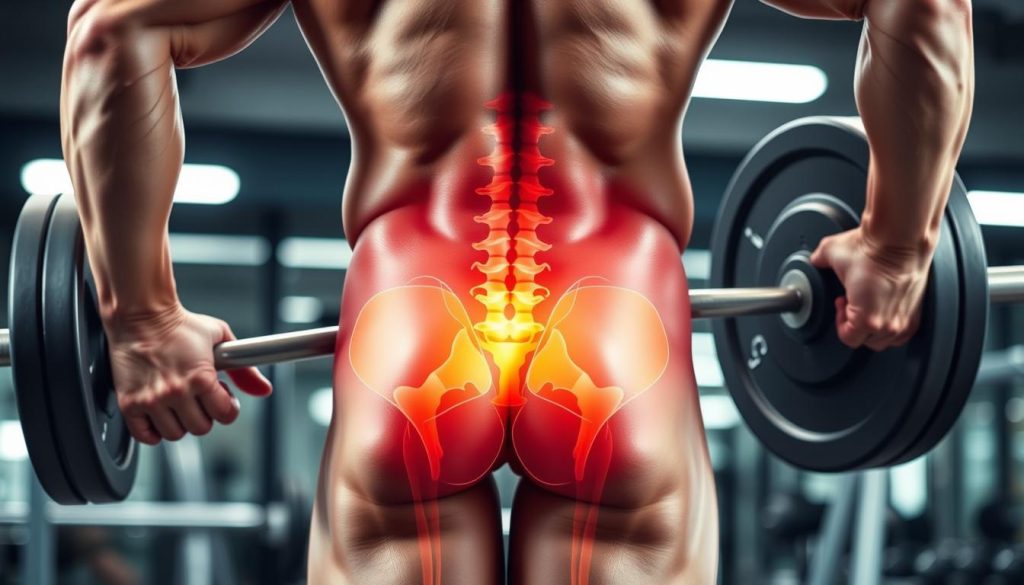
- Learning the right way to lift can lower the risk.
- Using tools like lifting belts or machines can help reduce strain.
- It’s also good to take breaks and stay hydrated.
Seeing the link between heavy lifting and hemorrhoids is key to prevention. Workers in tough jobs should use the right techniques and tools. This helps avoid putting too much pressure on the rectum, cutting down the chance of getting hemorrhoids.
Medications That May Exacerbate Hemorrhoid Risk
Knowing the risk factors for hemorrhoids is key to managing them. Some medicines can make hemorrhoids worse by causing constipation or raising pressure in the rectum. This part will talk about common medicines that raise the risk of hemorrhoids. It will also offer ways to stop hemorrhoids from getting worse.
Many medicines, both over-the-counter and by prescription, can affect hemorrhoids. Opioid painkillers, for example, slow down the intestines, leading to constipation. Iron pills, antacids with aluminum, and some antidepressants also have this effect. Blood pressure drugs that reduce fluids make it harder to pass stool.
| Medication Type | Side Effect | Impact on Hemorrhoids |
|---|---|---|
| Opioid Painkillers | Reduces Gut Motility | Increases Constipation Risk |
| Iron Supplements | Causes Stomach Upset and Constipation | Can Lead to Straining |
| Antidepressants | Decrease in Motility and Dry Stools | Contributes to Anorectal Strain |
| Antacids with Aluminum | Causes Constipation | Increases Pressure on Hemorrhoidal Veins |
| Diuretics | Reduces Body Fluids | Dries Out Stools, Increasing Constipation |
Talking to your doctor about other medicines can help. You can also try different treatments that are less likely to cause hemorrhoids. Eating more fiber, drinking plenty of water, and exercising regularly can also help manage hemorrhoid symptoms.
Being proactive about your health can help stop hemorrhoids before they get worse. By focusing on these strategies, you can improve your health and quality of life.
Conclusion
In this article, we’ve looked at many ways to prevent and manage hemorrhoids. We’ve seen how important it is to take steps to avoid them. By knowing how our bodies work and how our lifestyle affects us, we can lower our risk.
Managing our weight, eating more fiber, drinking plenty of water, and exercising regularly are key. If you’re at risk because of your genes or health, working with a doctor can help. Remember, while hemorrhoids are common, they can be prevented and managed.
It’s crucial to know about the causes and how to prevent them. By focusing on healthy eating, exercise, and lifestyle choices, we can fight hemorrhoids better. If you start to feel symptoms, seeing a doctor quickly is important. With the right knowledge and actions, we can keep hemorrhoids away and stay comfortable.
FAQ
Q: What are the main risk factors for developing hemorrhoids?
A: Main risk factors include chronic constipation and straining, long sitting times, and being overweight. Lack of fiber and hydration also play a role. Lifestyle habits, genetics, age, and stress are other factors.
Q: How does chronic constipation contribute to hemorrhoid formation?
A: Straining during bowel movements from constipation increases rectal vein pressure. This can cause swelling and hemorrhoid formation.
Q: Can long periods of sitting cause hemorrhoids?
A: Yes, sitting for long times can put pressure on the rectal area. This can trigger hemorrhoid development.
Q: How does pregnancy affect the risk of developing hemorrhoids?
A: Pregnancy increases pressure on rectal veins due to the growing uterus. Hormonal changes and increased blood volume also raise the risk.
Q: What lifestyle changes can help prevent hemorrhoids?
A: To prevent hemorrhoids, avoid long sitting, exercise regularly, and eat a fiber-rich diet. Stay hydrated and manage weight. Also, treat chronic bowel issues like diarrhea or constipation.
Q: Why is obesity a significant risk factor for hemorrhoids?
A: Obesity increases hemorrhoid risk due to extra weight on rectal veins. This strain can cause swelling and hemorrhoid formation.
Q: How does diet influence hemorrhoid formation?
A: A low-fiber diet can lead to constipation and increase hemorrhoid risk. Lack of hydration also contributes to constipation. A fiber-rich diet and enough water help prevent hemorrhoids.
Q: Can exercise reduce the risk of hemorrhoids?
A: Yes, exercise improves circulation and bowel function. It strengthens pelvic muscles, reducing vein pressure in the rectal area.
Q: Does a family history of hemorrhoids increase my risk?
A: Family history may increase your risk due to genetics. However, lifestyle choices are also crucial. Knowing your family history can help you take preventive steps.
Q: Are older adults more susceptible to hemorrhoids?
A: Yes, older adults face a higher risk due to weakened rectal tissues and decreased mobility. They may also eat less fiber.
Q: Can chronic diarrhea lead to hemorrhoid development?
A: Yes, chronic diarrhea can lead to hemorrhoids. It causes frequent pressure and irritation in the rectal area during bowel movements.
Q: Does anal intercourse increase the risk of hemorrhoids?
A: Yes, anal intercourse can increase hemorrhoid risk. It can cause irritation, injury, and increased pressure in the rectal area.
Q: How does stress affect hemorrhoids?
A: Stress can affect bowel habits and gastrointestinal health. It may lead to constipation and increase hemorrhoid risk. Stress can also lead to poor dietary choices.
Q: What is key to managing hemorrhoid flare-ups and pain?
A: To manage flare-ups and pain, practice good bowel habits and avoid straining. Use appropriate treatments and follow a high-fiber diet for soft stools.
Q: Does heavy lifting affect the likelihood of developing hemorrhoids?
A: Heavy lifting can increase abdominal and rectal area pressure. This may contribute to hemorrhoid formation, especially with improper technique or excessive strain.
Q: Can certain medications exacerbate the risk of developing hemorrhoids?
A: Yes, some medications can cause constipation or other side effects that increase hemorrhoid risk. These include analgesics, antidepressants, and iron supplements, among others.












